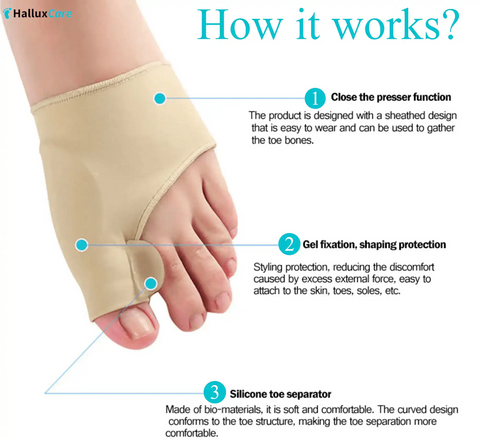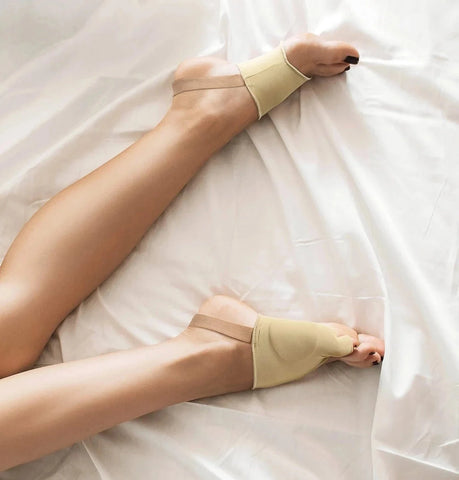Should You Get Bunion Surgery? A Real Reddit User’s Experience Explained
Bunion pain can be frustrating and, in some cases, debilitating. While bunion surgery is often seen as a long-term fix, deciding whether it's right for you requires careful consideration. A recent Reddit user’s candid experience about ongoing post-surgery pain sheds light on the importance of exploring both surgical and non-surgical options.
If you're searching for “bunion surgery recovery,” “non-surgical bunion treatment,” or “bunion pain relief,” this article offers expert-backed information, real-world testimonials, and practical solutions to help guide your decision.
---
A Redditor’s Caution: When Surgery May Not Be the Best Fix
A Reddit user shared that they underwent bunion surgery on their big toe nearly two years ago—and are still in pain. According to their post, the discomfort is now worse than before the procedure. While this experience is not typical, it does underscore a critical truth: bunion surgery is not a guaranteed fix for everyone.
🔍 Key Takeaways from the Reddit Comment
- Persistent Post-Surgery Pain: The Redditor still feels pain two years post-op, reminding us that healing timelines vary and complications can arise.
- Surgery Success Rates Are Generally Favorable: According to the American College of Foot and Ankle Surgeons (ACFAS), most bunion surgeries have high success rates, but outcomes depend on the severity of the deformity, the surgical technique used, and the patient’s post-op care.
- Surgery Isn’t Always Necessary: If your bunion doesn’t cause significant pain or limit your mobility, non-surgical solutions may be more appropriate.
---
What Causes Bunions & When Should You Worry?
👣 Understanding Bunions
A bunion (hallux valgus) is a misalignment of the big toe joint that causes a bony bump to develop at its base. Common causes include:
- Genetic predisposition
- Wearing narrow or high-heeled shoes
- Arthritis or joint inflammation
- Abnormal foot structure
🏥 When Is Surgery Recommended?
Bunion surgery—also known as a bunionectomy—is typically considered when:
- Pain limits your daily activities
- There's visible deformity or worsening misalignment
- Conservative treatments (e.g., orthotics, splints) fail
According to Mayo Clinic, surgery is usually a last resort once non-invasive measures have been exhausted.
---
Alternatives to Bunion Surgery: Relief Without the Scalpel
If you're not ready for surgery, you're not alone. In fact, many podiatrists recommend trying conservative management first.
🧦 Top Non-Surgical Options
- Orthopedic Sleeves and Splints: These devices support toe alignment and reduce pressure on the bunion. A study published in the Journal of Foot and Ankle Research found that bunion splints can help relieve symptoms in mild to moderate cases.
- Custom Orthotics: Medical-grade inserts redistribute pressure across the foot, helping reduce bunion irritation.
- Anti-inflammatory Creams and Oils: Topical treatments containing ingredients like castor oil or arnica can reduce swelling and discomfort.
- Stretching and Strengthening Exercises: Regular foot exercises can enhance flexibility and strengthen supporting muscles, which may slow bunion progression.
---
Why Consider the HalluxCare Orthopedic Sleeve?
The HalluxCare Orthopedic Bunion Pain Relief & Correction Sleeve is designed for individuals with mild to moderate bunion discomfort. Here's what makes it stand out:
- ✅ Podiatrist-approved design
- ✅ Helps gently realign the toe over time
- ✅ Made from breathable, medical-grade materials
- ✅ Comfortable enough for all-day wear—even in shoes
This sleeve is not intended to "cure" bunions but to manage symptoms effectively and delay or avoid surgery.
---
Final Thoughts: Surgery Isn’t One-Size-Fits-All
The Redditor’s story is a reminder that while bunion surgery can be effective, it's not a quick fix—and not everyone will have the same outcome.
Before making a decision, consider:
- Have I exhausted conservative treatments?
- Is my bunion worsening or impacting my quality of life?
- Am I informed about the potential risks and recovery timeline?
Consulting a board-certified podiatrist can help you determine the best course of action based on your specific case.
---
✅ Key Takeaways
- Not all bunions require surgery—many can be managed non-surgically.
- Surgery has generally high success rates, but complications and prolonged recovery are possible.
- Real-world experiences, like the Reddit comment, highlight the importance of due diligence.
- Orthopedic sleeves and conservative treatments are effective first-line options.
- Always consult a medical professional before making treatment decisions.
---
📌 Practical Tips & Real-World Applications
- Wear wide-toe box shoes to avoid unnecessary pressure on the bunion.
- Use bunion sleeves consistently for best results—especially during activity.
- Apply anti-inflammatory oils or creams at night to reduce swelling.
- Introduce toe stretching exercises into your daily routine (e.g., towel scrunches, toe spreads).
- Keep a symptom journal to track pain levels and what treatments help most.
---
❓ Frequently Asked Questions (FAQs)
Q: How long is recovery from bunion surgery?
A: Recovery can take 6–12 weeks for light activity, but full healing may take up to 6 months or more depending on the procedure.
Q: Will bunions come back after surgery?
A: There’s a small risk of recurrence. Following post-op instructions and wearing proper footwear can help prevent this.
Q: Can bunion sleeves really help?
A: Yes. While they won’t reverse a bunion, they can alleviate pain, reduce pressure, and support better toe alignment.
Q: What’s the best time to consider surgery?
A: When conservative treatments no longer help and your quality of life is significantly impacted.
Q: Can bunions get worse if untreated?
A: Yes. Bunions can progress over time, leading to increased pain, joint stiffness, and difficulty walking.
---
Recommended HalluxCare Bunion Relief Products
If you're looking for relief from bunion pain, consider using the Orthopedic Bunion Pain Relief & Correction Sleeve , which provides support and helps to alleviate discomfort.
For additional protection, the Tailor's Bunion Bunionette Pain Relief Protection Sleeves are designed to offer comfort and protection for bunionette pain.
To nourish and soothe the skin around bunions, as well as to promote healthy hair, consider the Jamaica Black Castor Oil Soothing Oil . Known for its moisturizing and anti-inflammatory properties, it helps alleviate discomfort around bunions and supports hair growth and scalp health.
---
📢 Share Your Experience
Have you tried bunion surgery or non-surgical options like correction sleeves? What worked best for you? Let us—and fellow readers—know in the comments!
---
Disclaimers & Disclosures
This article is for informational purposes only and does not constitute medical advice. Always consult a licensed healthcare provider for diagnosis and treatment. Some links in this article may be affiliate links, meaning we may earn a small commission at no extra cost to you.
---
References
- American College of Foot and Ankle Surgeons. “Bunions (Hallux Valgus).” www.acfas.org
- Mayo Clinic. “Bunion Surgery.” www.mayoclinic.org
- Journal of Foot and Ankle Research. "Effects of Bunion Splints on Hallux Valgus: A Systematic Review."
- American Podiatric Medical Association. “Understanding Foot Surgery.” www.apma.org
---




